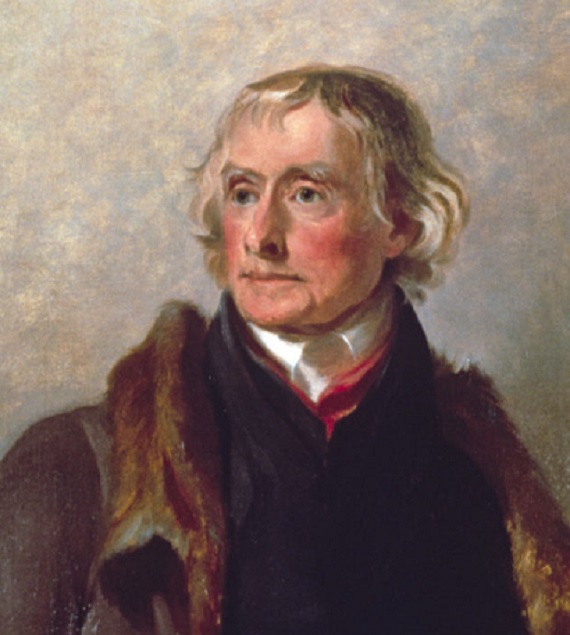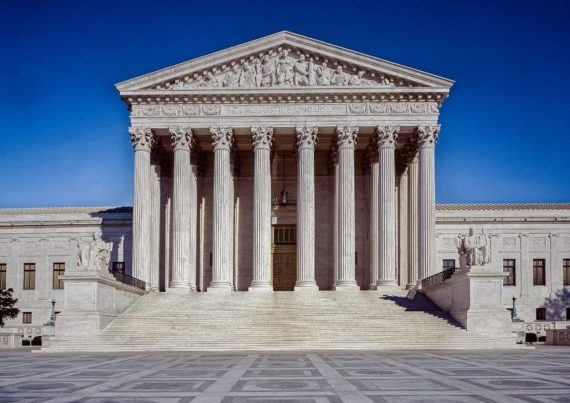Government, Thomas Jefferson all too frequently notes, is for the sake of the wellbeing of all citizens, each considered the political equal of all others and, in consequence, deserving of the same rights. Government, thus, exists for the sake of the wellbeing of all citizens, considered as individuals. Government, he often says, is of and for the people.
That noted, Jefferson also avows that humans—like prides of lions, pandemonia of parrots, packs of wolves, puffinries of puffins, and rafts of penguins—are fundamentally social creatures. Each like all others is endowed with a God-implanted sense of right and wrong as well as a sense of beauty and deformity, and so those sensory faculties determine the sort of state that works for the sake of the happiness of its citizens. Government, on this construal, exists for the sake of the wellbeing of the political/social system, which if properly structured, will allow for most citizens to flourish.
And so, we have two interpretations of bedrock of Jeffersonian republicanism: Lockean Liberalism (or Liberal Atomism) and Classical Republicanism (or communitarianism of some sort).
The first—the Lockean liberal interpretation—is championed by most scholars. T.V. Smith in “Thomas Jefferson and the Perfectibility of Mankind,” says that good life, for Jefferson, is one of political participation with the liberty, at day’s end, to be left alone to do what one wants to do. “Government itself, the very framework of outer accommodation, indeed exists primarily to protect … the privacy of the individual. This privacy is the very seedbed in which ideals germinate and in which alone they can securely grow and proliferate.” Horace Kallen, in “The Arts and Thomas Jefferson,” posits that freedom is Jefferson’s telos. “For Jefferson, Freedom is the going and the goal. Even happiness is not so elemental. For happiness is not an unalienable right; only the pursuit of happiness is.” In Jeffersonianism in the Progressive Era,” Jeffrey Sedgwick says that Jefferson’s “liberty” is Machiavellian, not friendly. “His commitment to liberty reflects a Machiavellian moment, an encouragement of civic prickliness, rather than civic friendship, with the anticipated result of political conflict conducive to change and progress.” Liberty for Jefferson is the right to withdraw.
Thus, Lockean liberals believe that Jefferson’s conception of liberty is a code of restraint on heavy-handed government, exercised by a few or many. Freed from potential abuse through political intervention in their affairs, citizens are at liberty to manage their own affairs as they see fit to do so, and things are best if and only if that occurs. Liberty, consequently, is equivalent to governmental non-intervention is citizens’ concerns.
The second—the Classical republican interpretation—is championed by scholars such as J.G.A. Pocock in The Machiavellian Moment, Lance Banning in The Jeffersonian Persuasion, and Garry Wills in Inventing America. Those revisionists maintain that there is more of Plato, Aristotle, and Cicero in Jefferson’s political thinking than of Locke. For Jefferson, the “state” is the primary political entity. Individuals come and pass, but the state endures—for Plato, the city-state has a greater claim to quiddity (being something real) than does any of its members!—and so, individuals are duty-bound to serve the state, even if it means service to the detriment of their own affairs. Yet when the state thrives, most of the persons in it do as well, or at least, well enough.
The debate, still unresolved, occurs only on account of entertaining a false dichotomy: Jefferson was either committed to liberal individualism or to republican communitarianism, grounded in Greco-Roman thinking. The first posits, by means of a political philosophy, the axiological primacy of the individual; the second, the axiological primacy of the state, with axiology indicative what is of greatest value in a political or philosophical system.
Neither side sees the two views reconcilable. They are. The influence of both traditions on Jefferson’s political philosophy is profound, and his political philosophy is fundamentally a reconciliation of the two: His political thinking privileges individuals, but his commitment to a moral sense makes humans axially social creatures with social duties. In consequence, I have, from the start of my scholarship on Jefferson, dubbed him a liberal eudaimonist—one who thinks that the state and its individuals are jointly axial or foundational.[1]
It is readily graspable why anyone would paint Jefferson as a liberal atomist, for there is an abundancy of references strongly suggestive of any well-structured state being only for the sake of its citizens. Yet there is the sticky problem of Jefferson’s human moral sense, which is substratal to his republicanism. Humans are inescapably social creatures, because they are inescapably moral creatures with moral duties: to others and to God. Thus, there is no retreat from political participation, because there is no retreat from moral responsibility, even in retirement. Jefferson states that unequivocally in a letter to Peter Carr (10 Aug. 1787).
Man was destined for society. His morality therefore was to be transformed to this object. He was endowed with a sense of right and wrong merely relative to this.
Thus, morality demands political participation in a morally responsible manner and disallows a separation of one’s public persona and one’s private persona. Jefferson says two years later in a letter to James Madison (28 Aug. 1789):
I know but one code of morality for men, whether acting singly or collectively. He who says I will be a rogue when I act in company with a hundred others, but an honest man when I act alone, will be believed in the former assertion, but not in the latter.
There is, therefore, an ineliminable communitarian strain in Jefferson’s political thought because of the constitution of humans, substratally social creatures.
What scholars have missed throughout is Jefferson’s allegiance not just to a society in the political service of its individuals, but also to a morally just society—i.e., one that is structured to encourage fullest political participation and virtuous activity so that they is a sort of wellbeing to the whole.[2] As his natural-aristoi letter to John Adams (28 Oct. 1813) shows, virtue is literally assured by Jefferson’s political schema: Virtuous political officials are voted into office by an educated citizenry and they are morally answerable to that citizenry. Nothing here is forced. Jefferson’s schema neatly aligns itself with the innate tendency that all have for morally correct action by feeling that characterizes his moral-sense ethics.
Consequently, Jefferson’s conception of liberty is normatively packed and wedded to a notion of human flourishing that involves virtuous activity. Liberty is more than doing what one has to do so that one can retire to one’s own affairs. Jefferson is committed to liberty in the service of human flourishing, where flourishing entails commitments to liberty and virtue—i.e., a duty to one’s fellow citizens. Individuals cannot flourish without a flourishing state, and the converse.
Along such lines, Jefferson was not above some level of government intervention in citizens’ affairs to promote human flourishing. He proposed a constitutional amendment in 1806 that would allow for improvements toward the general welfare—viz., the opening of roads, clearing of rivers, and building of canals. “What he was advocating,” writes Dumas Malone in his book on Jefferson’s second term as president, “was a comprehensive national system which would embrace ‘all the great interests of the Union’ and diffuse and increase national wealth ‘by opening an intercourse between the remotest extremes’ of the country.”
Jefferson’s most comprehensive explication of humans’ social instinct occurs in his “Opinion on the French Treaties” (1793), written while Jefferson was George Washington’s secretary of state. Jefferson begins with a statement, smacking of liberal atomism.
I consider the people who constitute a society or nation as the source of all authority in that nation. The Moral duties which exist between individual and individual in a state of nature, accompany them into a state of society & the aggregate of the duties of all the individuals composing the society constitutes the duties of that society towards any other; so that between society & society the same moral duties exist as did between the individuals composing them while in an unassociated state, their maker not having released them from those duties on their forming themselves into a nation. Compacts then between nation & nation are obligatory on them by the same moral law which obliges individuals to observe their compacts.
If my reading of Jefferson is correct, then both Lockean Liberals and Classical Republicans are mistaken, for the two views are not mutually exhaustive: There is a third option. Jefferson considered that a state is best when it functions for the wellbeing of its citizens and its citizens are best when they function for the wellbeing of their state.
************************************
[1] Eudaimonia being the Greek word for “happiness” or “human thriving.” M. Andrew Holowchak, Dutiful Correspondent: Philosophical Essays on Thomas Jefferson (Lanham, MD: Rowman & Littlefield, 2013), chap. 1.
[2] TJ to Thomas Jefferson Randolph, 24 Nov. 1808; TJ to Pierre Samuel Dupont de Nemours, 24, Apr. 1816; “Opinion of the French Treaties,” Thomas Jefferson, Writings, Ed. Merrill D. Peterson (New York: The Library of America, 1984), 432.







“I consider the people who constitute a society or nation as the source of all authority in that nation……” with that said are there TJ statements that buttress this feeling that include and synthesize his notions of proper size of govt and republics?
Scott, TJ’s Second Inaugural Address covers that issue. Like Madison, he thought that the larger the republic, the more dissenting elements would be drowned out. He also elsewhere envisioned the world as a republic of sorts, with nations, like states, as “independent” entities with their own republican constitutions.